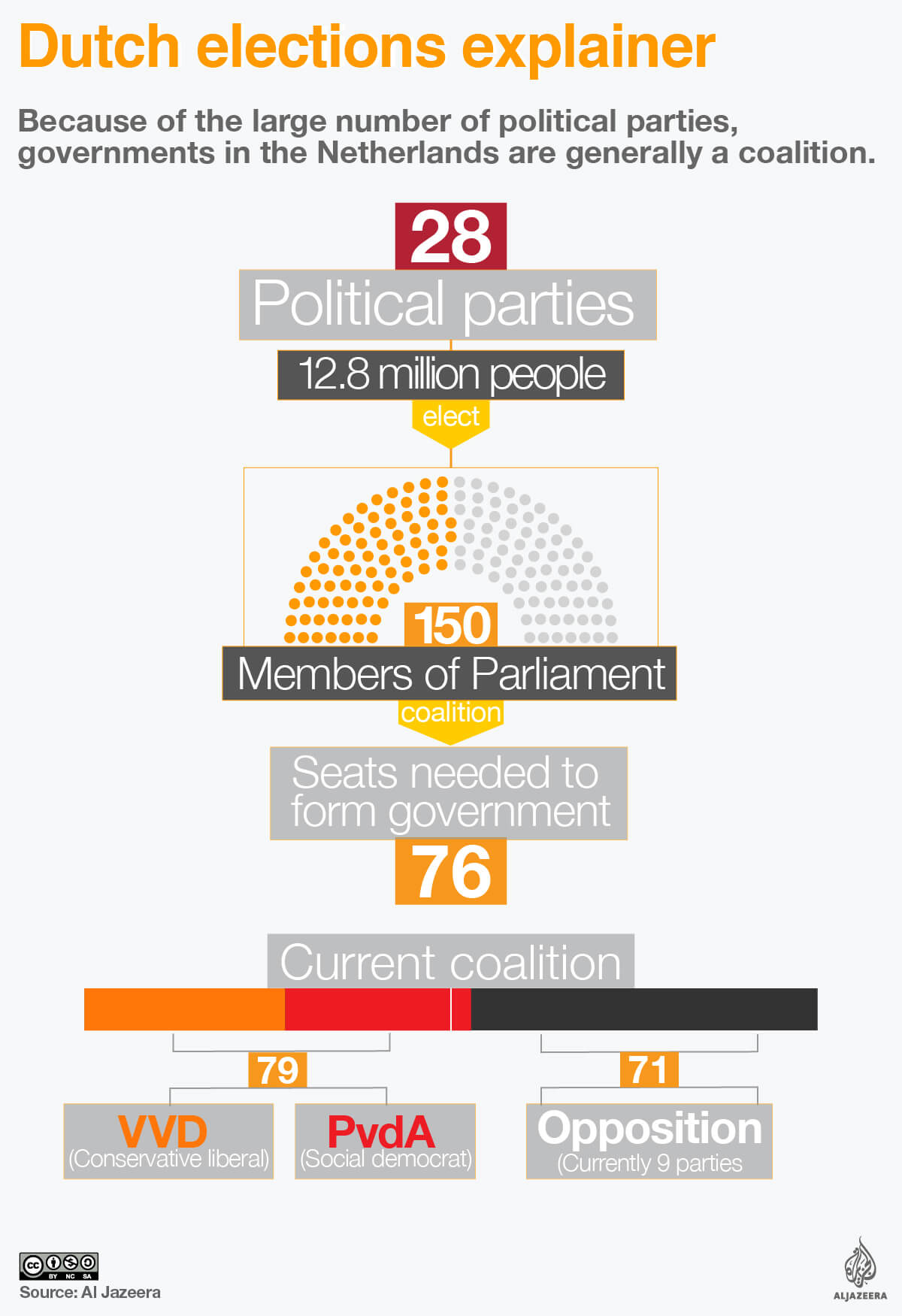Dutch election: Vote under way in key national poll
Crucial vote boiled down to a race between Prime Minister Mark Rutte’s Liberals and far-right party of MP Geert Wilders.

Dutch voters cast their ballots on Wednesday in a crucial legislative election, with pollsters predicting a close result and a fragmented parliament.
The vote, which has been overshadowed by a diplomatic dispute between the Netherlands and Turkey, has essentially come down to a tight race between Prime Minister Mark Rutte’s centre-right party and that of far-right, anti-Islam populist’s Geert Wilders.
Keep reading
list of 4 itemsIn Mexico’s election, candidates grapple with the search for the missing
Lawrence Wong set to take centre stage as Singapore’s new prime minister
Key takeaways as ex-Trump lawyer Michael Cohen testifies in New York trial
In advance of the vote, opinion polls showed Rutte’s liberal VVD narrowly leading the race, and even if Wilders’ PVV emerges as the biggest party in parliament, it is unlikely to obtain the majority of the 150 seats enabling it to form a government. Most parties have pledged not to govern with the PVV.
READ MORE: Dutch Muslims reflect on Geert Wilders before vote
Most polls opened at 7:30am (06:30 GMT), while an initial exit poll was expected immediately after 9pm (20:00 GMT) when the last voting stations close.
Overall, some 13 million people are eligible to vote and 28 parties are competing for the 150 seats in the Dutch lower house of parliament.

‘Divisive campaign’
Al Jazeera’s Dominic Kane, reporting from a polling station at The Hague, said there was “great enthusiasm” among voters casting their ballots.
“The city of Rotterdam has said that at least 10,000 people have voted in the first hour,” Kane said.
“We will get the verdict this evening after an election campaign that has been very divisive and has seen expressions from different party leaders concerning Islam, immigration and the economy.”
Wilders has vowed to shut mosques, ban the Quran and close the country’s borders. He also wants to pull the country out of the European Union , an institution that it helped found, in a so-called Nexit.
Rutte, seeking to lead The Netherlands for a third successive term, is a liberal free-marketeer championing this year’s election on a pledge of safety and stability.
Analysts said his uncharacteristically strong stand since the weekend in a diplomatic crisis with Turkey – when Dutch authorities expelled one Turkish minister while another was refused permission to fly into the country to attend a political rally – has boosted his image with voters.
“When people look for leadership, they look to me,” Rutte told a final debate late on Tuesday.
Litmus test
Final polls released late on Tuesday appeared to show Rutte pulling away from Wilders, crediting the VVD with coming top with 24 to 28 seats.
Wilders was seen as slipping yet again and barely clinging on to second place with between 19 and 22 MPs. That would however still be well up on the 12 MPs his party has in the outgoing parliament.
The Dutch pride themselves on their consensus politics, and reportedly it takes an average of three months of hard bargaining to cobble together a coalition. Observers predict this time round, however, four or even five parties may be needed to reach the 76-seat majority.
READ MORE: Who votes for Geert Wilders?
While traditional Labour has fallen sharply this year in the polls, the left-wing GroenLinks and its charismatic young leader Jesse Klaver are enjoying a huge boost.
The 30-year-old Klaver said it was “time for a new leadership” and called for The Netherlands to welcome more refugees .
He has boosted his party in the polls and may win 16 to 18 seats, which could place him in a powerful kingmaker role.
Following last year’s shock Brexit vote, and Donald Trump’s victory in the US presidential polls, the Dutch elections are being seen as a litmus test of the strength of far-right and populist parties before other polls in Europe this year, namely in France and Germany .
|
|